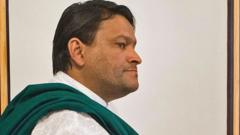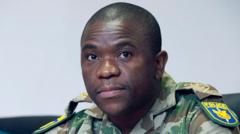Muhsin Hendricks, an acclaimed openly gay imam, was fatally shot in South Africa, prompting fear within the LGBTQ+ community while bolstering efforts to combat marginalization in religious spheres. His death, viewed as a hit, emphasizes ongoing discrimination and the necessity for transformation in faith-based contexts.
Murder of Pioneering Gay Imam Sparks Outcry and Calls for Change in South Africa

Murder of Pioneering Gay Imam Sparks Outcry and Calls for Change in South Africa
The tragic death of South Africa's first openly gay imam, Muhsin Hendricks, has intensified discussions on LGBTQ+ rights within religious communities and the need for inclusive practices.
The execution-style killing of Muhsin Hendricks, an openly gay imam renowned for challenging traditional boundaries in South Africa, has raised alarm among the LGBTQ+ community and advocates for religious inclusion.
Hendricks was shot dead in Gqeberha on Saturday, with details emerging that he was en route to officiate interfaith weddings just before his tragic death. His Al-Gurbaah Foundation clarified that he was not performing a same-sex wedding, countering initial media reports, which highlighted his commitment to breaking barriers imposed by conservative Islamic views on relationships.
Reverend Toni Kruger-Ayebazibwe, who identified as an openly gay Christian cleric, described the imam as a "gentle spirit" and a source of inspiration for countless queer Muslims around the world. South Africa's first openly gay imam had dedicated his life to bridging the gap between faith and sexuality, founding "The Inner Circle," a support network for queer Muslims.
Despite South Africa's progressive laws—being the first African nation to legalize same-sex marriage—the country’s LGBTQ+ community continues to confront violence and stigmatization. Eminent religious bodies like the Muslim Judicial Council and the United Ulama Council condemned Hendricks' murder, yet they struggled with reconciling their conservative beliefs with the emerging need for tolerance within their ranks.
Religious figures and LGBTQ+ activists alike emphasized that Hendricks represented hope and a possibility for reconciliation between faith and sexual orientation. However, the backlash following his death, particularly on social media, raised concerns about the ongoing risks faced by LGBTQ+ individuals within faith communities.
Dr. Fatima Essop, a senior lecturer in Islamic Studies, expressed shock at the vitriol directed at Hendricks after his death, declaring that such hostility runs contrary to the core Islamic principles of compassion and mercy. In light of Hendricks' legacy, many activists insist that the fight for acceptance within religious frameworks will persist despite the increased risks.
As plans for a memorial service for Hendricks are underway, LGBTQ+ activists, led by figures like Teboho Klaas from The Other Foundation, remain determined to advocate for their rights, asserting that although Hendricks's life was cut short, his influence will endure, inspiring future generations to pursue a more inclusive faith landscape in South Africa.


















